09届高三英语总复习之句子系列复习(1)
- 格式:doc
- 大小:104.50 KB
- 文档页数:10
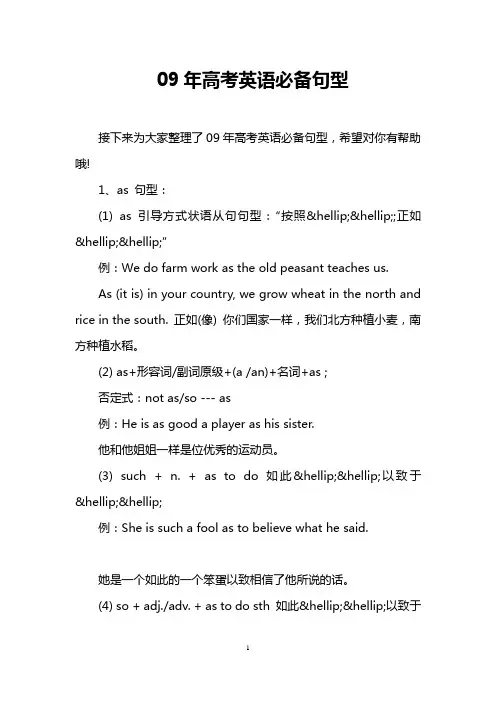
09年高考英语必备句型接下来为大家整理了09年高考英语必备句型,希望对你有帮助哦!1、as 句型:(1) as引导方式状语从句句型:“按照……;正如……”例:We do farm work as the old peasant teaches us.As (it is) in your country, we grow wheat in the north and rice in the south. 正如(像) 你们国家一样,我们北方种植小麦,南方种植水稻。
(2) as+形容词/副词原级+(a /an)+名词+as ;否定式:not as/so --- as例:He is as good a player as his sister.他和他姐姐一样是位优秀的运动员。
(3) such + n. + as to do 如此……以致于……例:She is such a fool as to believe what he said.她是一个如此的一个笨蛋以致相信了他所说的话。
(4) so + adj./adv. + as to do sth 如此……以致于……例:He was so strong as to carry the heavy box.他是如此的强壮以致于能提起那重箱子。
(5) such --- as---象……之类的…… (接名词或定语从句)例:He wished to be such a man as Lei Feng was.他希望成为一个像雷锋这样的人。
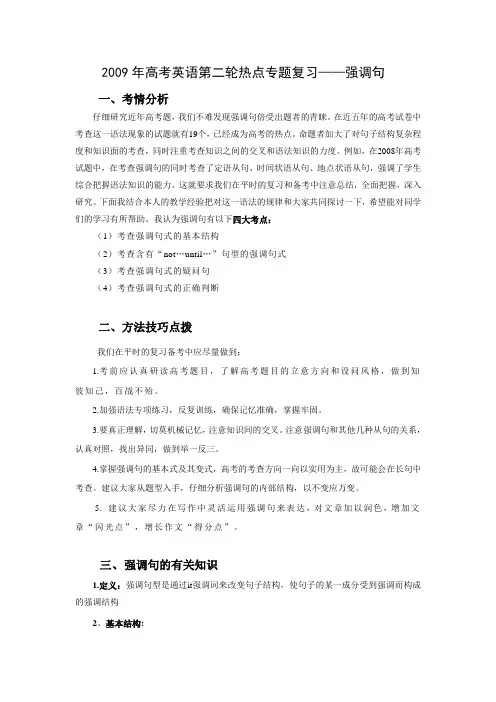
2009年高考英语第二轮热点专题复习——强调句一、考情分析仔细研究近年高考题,我们不难发现强调句倍受出题者的青睐。
在近五年的高考试卷中考查这一语法现象的试题就有19个,已经成为高考的热点。
命题者加大了对句子结构复杂程度和知识面的考查,同时注重考查知识之间的交叉和语法知识的力度。
例如,在2008年高考试题中,在考查强调句的同时考查了定语从句、时间状语从句、地点状语从句,强调了学生综合把握语法知识的能力。
这就要求我们在平时的复习和备考中注意总结,全面把握,深入研究。
下面我结合本人的教学经验把对这一语法的规律和大家共同探讨一下,希望能对同学们的学习有所帮助。
我认为强调句有以下四大考点:(1)考查强调句式的基本结构(2)考查含有“not…until…”句型的强调句式(3)考查强调句式的疑问句(4)考查强调句式的正确判断二、方法技巧点拨我们在平时的复习备考中应尽量做到:1.考前应认真研读高考题目,了解高考题目的立意方向和设问风格,做到知彼知己,百战不殆。
2.加强语法专项练习,反复训练,确保记忆准确,掌握牢固。
3.要真正理解,切莫机械记忆,注意知识间的交叉。
注意强调句和其他几种从句的关系,认真对照,找出异同,做到举一反三。
4.掌握强调句的基本式及其变式,高考的考查方向一向以实用为主,故可能会在长句中考查。
建议大家从题型入手,仔细分析强调句的内部结构,以不变应万变。
5. 建议大家尽力在写作中灵活运用强调句来表达,对文章加以润色,增加文章“闪光点”,增长作文“得分点”。
三、强调句的有关知识1.定义:强调句型是通过it强调词来改变句子结构,使句子的某一成分受到强调而构成的强调结构2、基本结构:(1) 陈述句的强调句型:It is/ was + 被强调部分(通常是主语、宾语或状语)+ that/ who (当强调主语且主语指人)+ 其它部分。
强调句可以强调除谓语以外的一切成分。
下面我们针对I met Li Ming at the railway station yesterday.句子进行强调。
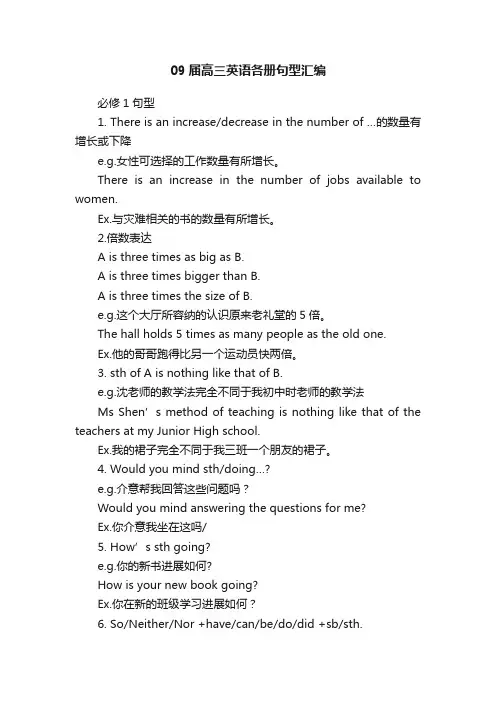
09届高三英语各册句型汇编必修1句型1. There is an increase/decrease in the number of …的数量有增长或下降e.g.女性可选择的工作数量有所增长。
There is an increase in the number of jobs available to women.Ex.与灾难相关的书的数量有所增长。
2.倍数表达A is three times as big as B.A is three times bigger than B.A is three times the size of B.e.g.这个大厅所容纳的认识原来老礼堂的5倍。
The hall holds 5 times as many people as the old one.Ex.他的哥哥跑得比另一个运动员快两倍。
3. sth of A is nothing like that of B.e.g.沈老师的教学法完全不同于我初中时老师的教学法Ms Shen’s method of teaching is nothing like that of the teachers at my Junior High school.Ex.我的裙子完全不同于我三班一个朋友的裙子。
4. Would you mind sth/doing…?e.g.介意帮我回答这些问题吗?Would you mind answering the questions for me?Ex.你介意我坐在这吗/5. How’s sth going?e.g.你的新书进展如何?How is your new book going?Ex.你在新的班级学习进展如何?6. So/Neither/Nor +have/can/be/do/did +sb/sth.e.g.(1) --I have just been to my first language class.--So have I.我也是。
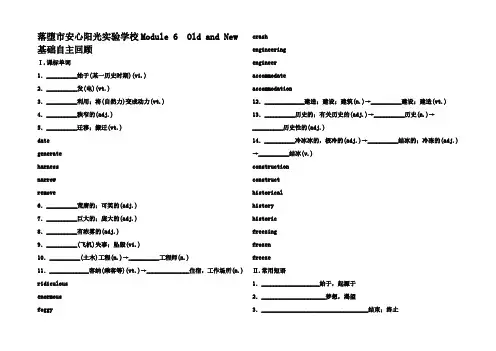
落堕市安心阳光实验学校Module 6 Old and New 基础自主回顾Ⅰ.课标单词1.__________始于(某一历史时期)(vi.)2.__________发(电)(vt.)3.__________利用;将(自然力)变成动力(vt.)4.__________狭窄的(adj.)5.__________迁移;搬迁(vt.)dategenerateharnessnarrowremove6.__________荒唐的;可笑的(adj.)7.__________巨大的;庞大的(adj.)8.__________有浓雾的(adj.)9.__________(飞机)失事;坠毁(vi.)10.__________(土木)工程(n.)→__________工程师(n.)11._____________容纳(乘客等)(vt.)→______________住宿,工作场所(n.) ridiculousenormousfoggy crashengineeringengineeraccommodateaccommodation12._____________建造;建设;建筑(n.)→__________建设;建造(vt.) 13.__________历史的;有关历史的(adj.)→__________历史(n.)→__________历史性的(adj.)14.__________冷冰冰的,极冷的(adj.)→__________结冰的;冷冻的(adj.)→__________结冰(v.)constructionconstructhistoricalhistoryhistoricfreezingfrozenfreezeⅡ.常用短语1.___________________始于,起源于2._____________________梦想,渴望3.___________________________________结束;终止4.______________________正对……进行访问5.________________________阻止6._____________________等于,胜任,和……匹敌date from/ back todream of/ aboutbring an end to sth./ bring sth. to an endbe on a visit tohold backbe equal to7.____________有意义;有道理8.____________(梦想等)变成现实9.____________算出;解决10.____________划掉,删掉11.____________既然,由于make sensecome truework outcross outnow thatⅢ.重点句型1.It ____________________ US $ 20 billion.它花费了6年时间建成,耗资200亿美元。
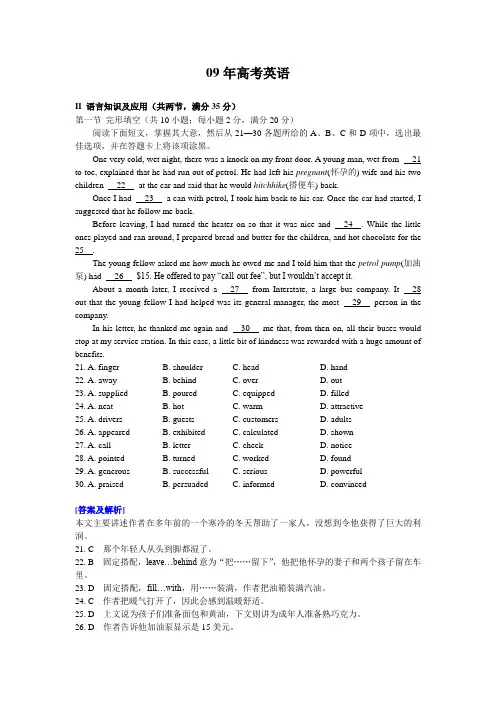
09年高考英语II 语言知识及应用(共两节,满分35分)第一节完形填空(共10小题;每小题2分,满分20分)阅读下面短文,掌握其大意,然后从21—30各题所给的A、B、C和D项中,选出最佳选项,并在答题卡上将该项涂黑。
One very cold, wet night, there was a knock on my front door. A young man, wet from 21 to toe, explained that he had run out of petrol. He had left his pregnant(怀孕的) wife and his two children 22 at the car and said that he would hitchhike(搭便车) back.Once I had 23 a can with petrol, I took him back to his car. Once the car had started, I suggested that he follow me back.Before leaving, I had turned the heater on so that it was nice and 24 . While the little ones played and ran around, I prepared bread and butter for the children, and hot chocolate for the 25 .The young fellow asked me how much he owed me and I told him that the petrol pump(加油泵) had 26 $15. He offered to pay “call-out fee”, but I wouldn’t accept it.About a month later, I received a 27 from Interstate, a large bus company. It 28 out that the young fellow I had helped was its general manager, the most 29 person in the company.In his letter, he thanked me again and 30 me that, from then on, all their buses would stop at my service station. In this case, a little bit of kindness was rewarded with a huge amount of benefits.21. A. finger B. shoulder C. head D. hand22. A. away B. behind C. over D. out23. A. supplied B. poured C. equipped D. filled24. A. neat B. hot C. warm D. attractive25. A. drivers B. guests C. customers D. adults26. A. appeared B. exhibited C. calculated D. shown27. A. call B. letter C. check D. notice28. A. pointed B. turned C. worked D. found29. A. generous B. successful C. serious D. powerful30. A. praised B. persuaded C. informed D. convinced[答案及解析]本文主要讲述作者在多年前的一个寒冷的冬天帮助了一家人,没想到令他获得了巨大的利润。
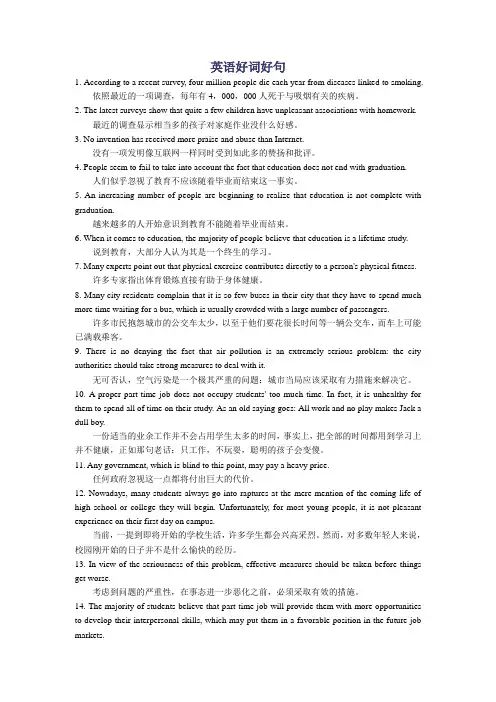
英语好词好句1. According to a recent survey, four million people die each year from diseases linked to smoking.依照最近的一项调查,每年有4,000,000人死于与吸烟有关的疾病。
2. The latest surveys show that quite a few children have unpleasant associations with homework.最近的调查显示相当多的孩子对家庭作业没什么好感。
3. No invention has received more praise and abuse than Internet.没有一项发明像互联网一样同时受到如此多的赞扬和批评。
4. People seem to fail to take into account the fact that education does not end with graduation.人们似乎忽视了教育不应该随着毕业而结束这一事实。
5. An increasing number of people are beginning to realize that education is not complete with graduation.越来越多的人开始意识到教育不能随着毕业而结束。
6. When it comes to education, the majority of people believe that education is a lifetime study.说到教育,大部分人认为其是一个终生的学习。
7. Many experts point out that physical exercise contributes directly to a person's physical fitness.许多专家指出体育锻炼直接有助于身体健康。
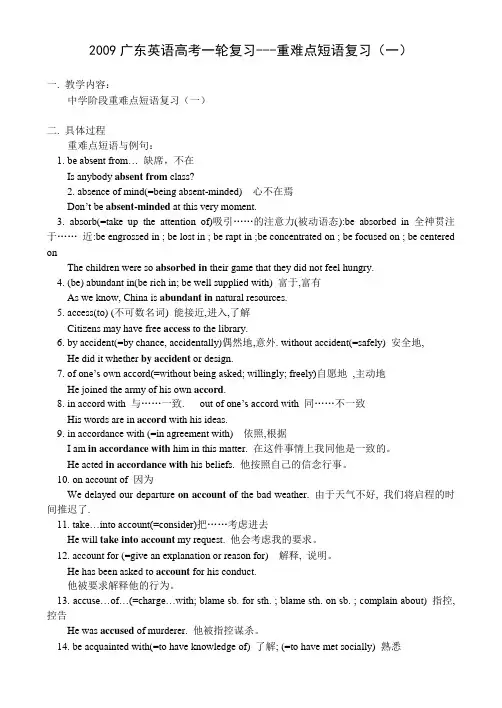
2009广东英语高考一轮复习---重难点短语复习(一)一. 教学内容:中学阶段重难点短语复习(一)二. 具体过程重难点短语与例句:1. be absent from… 缺席,不在Is anybody absent from class?2. absence of mind(=being absent-minded) 心不在焉Don’t be absent-minded at this very moment.3. absorb(=take up the attention of)吸引……的注意力(被动语态):be absorbed in 全神贯注于……近:be engrossed in ; be lost in ; be rapt in ;be concentrated on ; be focused on ; be centered onThe children were so absorbed in their game that they did not feel hungry.4. (be) abundant in(be rich in; be well supplied with) 富于,富有As we know, China is abundant in natural resources.5. access(to) (不可数名词) 能接近,进入,了解Citizens may have free access to the library.6. by accident(=by chance, accidentally)偶然地,意外. without accident(=safely) 安全地,He did it whether by accident or design.7. of one’s own accord(=without being asked; willingly; freely)自愿地,主动地He joined the army of his own accord.8. in accord with 与……一致. out of one’s accord with 同……不一致His words are in accord with his ideas.9. in accordance with (=in agreement with) 依照,根据I am in accordance with him in this matter. 在这件事情上我同他是一致的。
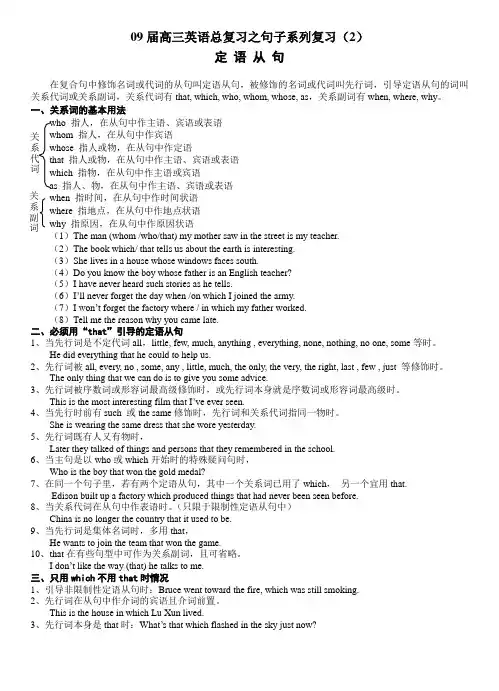
09届高三英语总复习之句子系列复习(2)定 语 从 句在复合句中修饰名词或代词的从句叫定语从句,被修饰的名词或代词叫先行词,引导定语从句的词叫关系代词或关系副词,关系代词有that, which, who, whom, whose, as ,关系副词有when, where, why 。
一、关系词的基本用法 who 指人,在从句中作主语、宾语或表语whom 指人,在从句中作宾语whose 指人或物,在从句中作定语that 指人或物,在从句中作主语、宾语或表语 which 指物,在从句中作主语或宾语as 指人、物,在从句中作主语、宾语或表语when 指时间,在从句中作时间状语 where 指地点,在从句中作地点状语 why 指原因,在从句中作原因状语 (1)The man (whom /who/that) my mother saw in the street is my teacher.(2)The book which/ that tells us about the earth is interesting.(3)She lives in a house whose windows faces south.(4)Do you know the boy whose father is an English teacher?(5)I have never heard such stories as he tells.(6)I’ll never forget the day when /on which I joined the army.(7)I won’t forget the factory where / in which my father worked.(8)Tell me the reason why you came late.二、必须用“that ”引导的定语从句1、当先行词是不定代词all ,little, few, much, anything , everything, none, nothing, no one, some 等时。
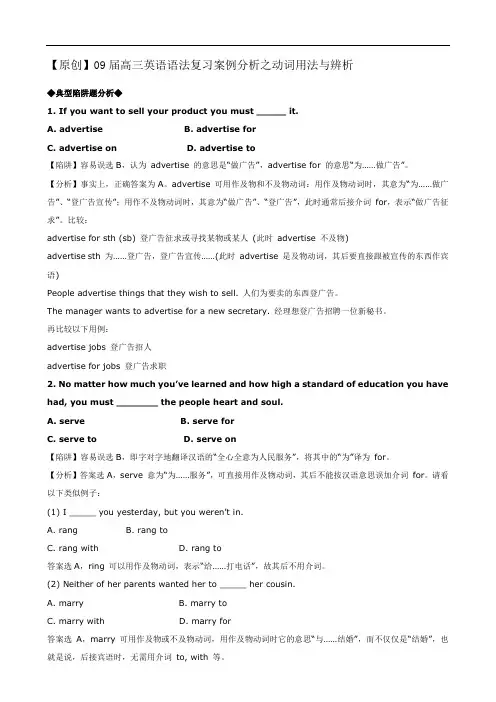
【原创】09届高三英语语法复习案例分析之动词用法与辨析◆典型陷阱题分析◆1. If you want to sell your product you must _____ it.A. advertiseB. advertise forC. advertise onD. advertise to【陷阱】容易误选B,认为advertise 的意思是“做广告”,advertise for 的意思“为……做广告”。
【分析】事实上,正确答案为A。
advertise 可用作及物和不及物动词:用作及物动词时,其意为“为……做广告”、“登广告宣传”;用作不及物动词时,其意为“做广告”、“登广告”,此时通常后接介词for,表示“做广告征求”。
比较:advertise for sth (sb) 登广告征求或寻找某物或某人(此时advertise 不及物)advertise sth 为……登广告,登广告宣传……(此时advertise 是及物动词,其后要直接跟被宣传的东西作宾语)People advertise things that they wish to sell. 人们为要卖的东西登广告。
The manager wants to advertise for a new secretary. 经理想登广告招聘一位新秘书。
再比较以下用例:advertise jobs 登广告招人advertise for jobs 登广告求职2. No matter how much you’ve learned and how high a standard of education you have had, you must _______ the people heart and soul.A. serveB. serve forC. serve toD. serve on【陷阱】容易误选B,即字对字地翻译汉语的“全心全意为人民服务”,将其中的“为”译为for。
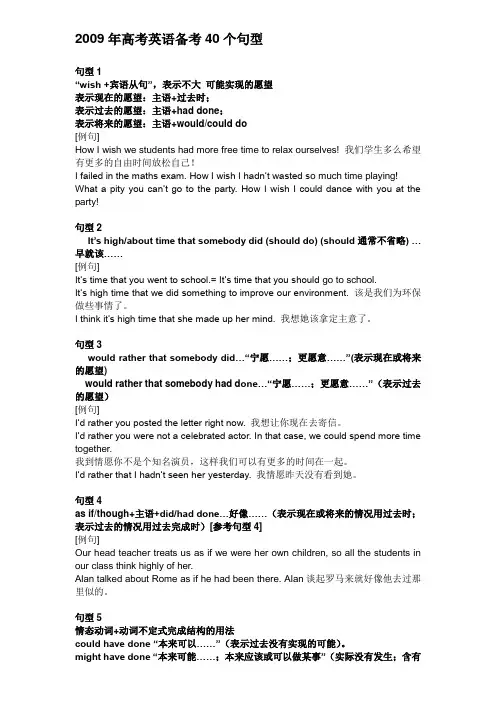
2009年高考英语备考40个句型句型1“wish +宾语从句”,表示不大可能实现的愿望表示现在的愿望:主语+过去时;表示过去的愿望:主语+had done;表示将来的愿望:主语+would/could do[例句]How I wish we students had more free time to relax ourselves! 我们学生多么希望有更多的自由时间放松自己!I failed in the maths exam. How I wish I hadn’t wasted s o much time playing! What a pity you can’t go to the party. How I wish I could dance with you at the party!句型2It’s high/about time that somebody did (should do) (should通常不省略) …早就该……[例句]It’s time that you went to school.= It’s time that you should go to school.It’s high time that we did something to improve our environment. 该是我们为环保做些事情了。
I think it’s high time that she made up her mind. 我想她该拿定主意了。
句型3would rather that somebody did…“宁愿……;更愿意……”(表示现在或将来的愿望)would rather that somebody had d one…“宁愿……;更愿意……”(表示过去的愿望)[例句]I’d rather you posted the letter right now. 我想让你现在去寄信。
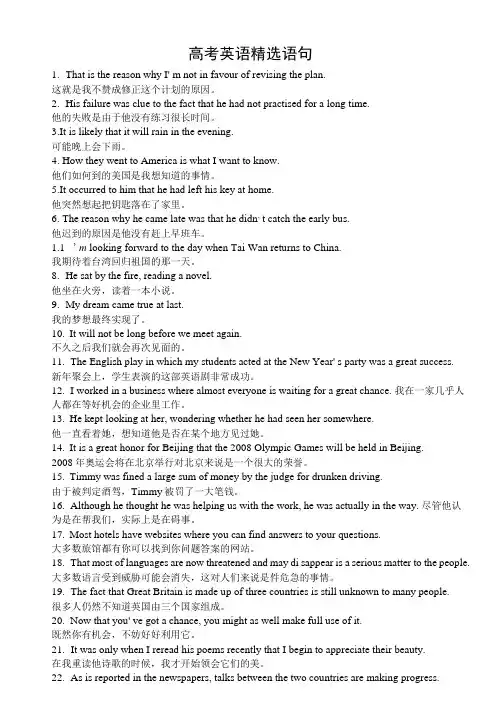
高考英语精选语句1.That is the reason why I' m not in favour of revising the plan.这就是我不赞成修正这个计划的原因。
2.His failure was clue to the fact that he had not practised for a long time.他的失败是由于他没有练习很长时间。
3.It is likely that it will rain in the evening.可能晚上会下雨。
4. How they went to America is what I want to know.他们如何到的美国是我想知道的事情。
5.It occurred to him that he had left his key at home.他突然想起把钥匙落在了家里。
6. The reason why he came late was that he didn, t catch the early bus.他迟到的原因是他没有赶上早班车。
1.1’ m looking forward to the day when Tai Wan returns to China.我期待着台湾回归祖国的那一天。
8.He sat by the fire, reading a novel.他坐在火旁,读着一本小说。
9.My dream came true at last.我的梦想最终实现了。
10.It will not be long before we meet again.不久之后我们就会再次见面的。
11.The English play in which my students acted at the New Year' s party was a great success.新年聚会上,学生表演的这部英语剧非常成功。
(09安徽)1. – I wonder how much you charge for your services.-- The first two are free the third costs $30.A. whileB. untilC. whenD. before【答案】A(09安徽)2 -- Could you be so kind as to close the window?-- .A. With pleasureB. Go aheadC. Yes, pleaseD. That's OK【答案】A(09北京)3. John plays basketball well, _____his favorite sport is badminton.A. soB. orC. yetD. for【答案】D(09北京)4. You may use room as you like ____ you clean it up afterwardsA. so far asB. so long asC. in caseD. even if【答案】C(09北京)5. At first he hated the new job but decided to give himself a few months to see___ it got any better.A. whenB. howC. whyD. if【答案】A(09福建)6. –Bruce, I really appreciate your handwriting.- .A. I practice every dayB. Thank you very muchC. No, I don’t think soD. Well, it’s not good enoug h【答案】B考查交际用语。
前一句表示赞扬,应答句应表示感谢,故选B。
(09湖南)7. ______ the police thought he was the most likely one, since they had no exactproof about it, they could not arrest him.A. AlthoughB. As long asC. If onlyD. As soon as【答案】A【解析】考查从属连词的用法。
09 届高三英语总复习之句子系列复习(1)一、句子成分主语( subject) : 句子说明的人或事物。
The sun rises in the east.(名词)He likes dancing.(代词)Twenty years is a short time in history. ( 数词 )Seeing is believing.(动名词)To see is to believe.(不定式)What he needs is a book. (主语从句)It is very clear that the elephant is round and tall like a tree.(It形式主语,主语从句是真实主语)谓语( predicate) : 说明主语的动作、状态和特点。
We study English.He is asleep.宾语: 1)动作的蒙受者----- 动宾I like China.(名词)He hates you. (代词)How many do you need? We need two.(数词)We should help the old and the poor.I enjoy working with you.(动名词)I hope to see you again.(不定式)Did you write down what he said?(宾语从句)2)介词后的名词、代词和动名词----- 介宾Are you afraid of the snake?Under the snow, there are many rocks.3)双宾语 ----- 间宾(指人)和直宾(指物)He gave me a book yesterday.Give the poor man some money.定语:修饰或限制名词或代词的词、词组或句子。
Miss Yang is a chemistry teacher.(名词)He is our friend.(代词)We belong to the third world.(数词)He was advised to teach the lazy boy a lesson.(形容词)The man over there is my old friend.( 副词 ) The woman with a baby in her arms is my sister. ( 介词 )The boys playing football are in Class 2.(此刻分词)The trees planted last year are growing well now.(过去分词)I have an idea to do it well.(不定式)You should do everything that I do.(定语从句)状语:用来修饰v., adj., adv., or 句子。
2009年高考英语复习知识汇总(一)语法复习一:句子成分;简单句、并列句和复合句一、句子成分(一)句子成分的定义:构成句子的各个部分叫做句子成分。
句子成分有主要成分和次要成分;主要成分有主语和谓语;次要成分有表语、宾语、定语、状语、补足语和同位语。
(二)主语:主语是一个句子所叙述的主体,一般位于句首。
但在there be结构、疑问句(当主语不疑问词时)和倒装句中,主语位于谓语、助动词或情态动词后面。
主语可由名词、代词、数词、不定式、动名词、名词化的形容词和主语从句等表示。
一句话语法: 主语由名词性的词来充当. 例如:During the 1990s, American country music has become more and more popular.(名词)We often speak English in class.(代词)One-third of the students in this class are girls.(数词)To swim in the river is a great pleasure.(不定式)Smoking does harm to the health.(动名词)The rich should help the poor.(名词化的形容词)When we are going to have an English test has not been decided.(主语从句)It is necessary to master a foreign language.(it作形式主语,真正的主语为后面的不定式)(三)谓语:谓语说明主语所做的动作或具有的特征和状态。
动词在句中作谓语,一般放在主语之后。
一句话语法: 谓语由动词充当. 有很多同学在写作的时候容易犯的错误就是要么乱用be动词,要么句子没有谓语动词. 谓语的构成如下:1、简单谓语:由一个动词或动词短语构成。
2009年高考英语试题分类汇编——特殊句式〔09福建〕1. For a moment nothing happened Thenall shouting together.A. voices had comeB. came voicesC. voices would comeD. did voices come【答案】B副词then位于句首,且当句子的主语是名词时,句子用全部倒装句,选B。
〔09湖南〕2. Every evening after dinner, if not from work, I will spend some time walking my dog.A. being tiredB. tiringC. tiredD. to be tired【答案】C省略句式。
在if引导的条件状语从句中,从句中复原应为if am not tired from work,根据省略的原如此,所以答案选C。
〔09湖南〕3. You and I could hardly work together, ?A. could youB. could n’t IC. couldn’t weD. could we【答案】D反义疑问句的用法。
根据陈述局部是肯定形式,疑问局部用否认形式;反之。
陈述局部中含有否认词hardly,故疑问局部用肯定形式,主语是you and i。
故应选D。
〔09湖南〕4. Either you or one of your students ______ to attend the meeting that is due tomorrow.A. areB. isC. haveD. be【答案】B主谓一致的用法。
Either …or…. 连接两个主语,按就近原如此来确定谓语的单复数。
One of your students 谓语应用单数形式。
〔09江西〕5. According to statistics, a man is more than twice as likely to die of skin cancer _________ a woman.A. thanB. suchC. soD. as【答案】D 比拟级的结构,as ….. as , 注意句中的more than 只是修饰twice〔09江西〕6. It was _____ he came bank from Africa that wear _________ he met the girl he would like to marry.A. when; thenB. not; untilC. not until; thatD. only; when【答案】C强调句型。
Chapter I SB I Units 1 - 2☆重点句型☆1. What should a friend be like? 询问对方的看法2. I think he / she should be…表示个人观点的词语3. I enjoy reading / I'm fond of singing / I like playing computer games. 等表示喜好的词语4. Chuck is on a flight when suddenly his plane crashes.“when"作并列连词的用法5. What / Who / When / Where is it that...? 强调句的特殊疑问句结构6. With so many people communicating in English everyday,... “with+宾语+宾补”的结构做状语7. Can you tell me how to pronounce...? 带连接副词(或代词)的不定式做宾补的用法☆重点词汇☆1. especially v. 特别地2. imagine v. 想像3. alone adv. / adj. 单独,孤独的4. interest n. 兴趣5. everyday adj. 每天的,日常的6. deserted adj. 抛弃的7. hunt v. 搜寻8. share v. 分享9. care v. 在乎,关心10. total n. 总数11. majority n. 大多数12. survive v. 生存,活下来13. adventure n. 冒险14. scared adj. 吓坏的15. admit v. 承认16. while conj. 但是,而17. boring adj. 令人厌烦的18. except prep. 除……之外19. quality n. 质量20. favourite adj. 最喜爱的☆重点短语☆1. be fond of爱好2. treat…as…把……看作为……3. make friends with 与……交朋友4. argue with sb. about / over sth. 与某人争论某事5. hunt for寻找6. in order to为了7. share…with与……分享8. bring in引进;赚钱9. a great / good many许多…10. have difficulty (in) doing做……有困难11. end up with以……结束12. except for除……之外13. come about发生14. make(a)fire生火15. make yourself at home别拘束16. the majority of大多数17. drop sb. a line给某人写短信18. for the first time第一次19. at all根本;竟然20. have a (good) knowledge of…精通……☆短语闯关☆下列短语都是这两个单元学过的重要短语,请你根据汉语在横线上填人一个正确的词,每个词4分,80分才能过关,你一定能过关,做好了闯关的准备吗?那么我们就开始吧?l. be fond ____ 喜欢,爱好 of2. hunt ____ 搜索。
2009高考前英语总复习资料重点讲解第一份资料完型填空1•首先要以很快的速度浏览全文,掌握文章的主旨,不要急于看选项。
浏览全文时要重点了 解文中所叙述的人物、时间、地点、事件,即who ,when ,where , what 。
完形命题的原则一般是第一句话不挖空,目的是使读者进入语境, 因此一定要认真阅读 这句话。
例如: Why is a space left between the rails of a railway line where one piece joins the next? 这句话从铁轨之间的缝隙引出了问题。
根据常识,文中内容应与热涨冷缩的物理现象有关。
2•根据故事情节的发展选词,确定所填的词与文中哪个词有关系以及动作是在什么场合发生 的。
3•试填之后将所选定的词放到文章中复读检查。
(字面译、通逻辑、搞代入、全文译 ”) 具体操作中应注意的问题1•看清上下文,找准定位词充分利用文章的上下文和前后句, 找到对选择有提示作用的词或句。
这些词有时可能是 同义词或反义词。
例如:1)Some parts of the water are very shallow. But in some places it is very very ____________A. deepB. highC. coldD. dan gerous根据转折连词but 的提示,所填入的词应与shallow 相反,因此答案为 A 。
questions and she didn ' t scold us either. and 是一个并列连词;either 为副词,用在否定句或否定词后加强语势,由此可以确定 所填的词也应是一个否定意义的词,因此答案是2. 通顺逻辑,寻求搭配等,同时要根据内容选择正确的短语。
例如:3. 扎实基础,搞清辨异选项中的四个词都表示不同的声音,但 B ,C ,D 项的三个词都是指从嗓子里发出的声2)Mrs O ' Neill askedA. noB. certa inC. manyD. more注意固定的搭配,包括动词与介词的搭配、动词与名词的搭配以及形容词与名词的搭配Soon I heard a like that of a door burst in and the n a climb of feet. A. soundB. cryC. voiceD. shout音,而sou nd则表示各种各样的声音。
09届高三英语总复习之句子系列复习(1)一、句子成分主语(subject): 句子说明的人或事物。
The sun rises in the east. (名词)He likes dancing. (代词)Twenty years is a short time in history. (数词) Seeing is believing. (动名词)To see is to believe. (不定式)What he needs is a book. (主语从句)It is very clear that the elephant is round and tall like a tree. (It形式主语,主语从句是真正主语)谓语(predicate): 说明主语的动作、状态和特征。
We study English. He is asleep.宾语:1)动作的承受者-----动宾I like China. (名词)He hates you. (代词)How many do you need? We need two. (数词)We should help the old and the poor. I enjoy working with you. (动名词)I hope to see you again. (不定式)Did you write down what he said? (宾语从句)2)介词后的名词、代词和动名词-----介宾Are you afraid of the snake? Under the snow, there are many rocks.3)双宾语-----间宾(指人)和直宾(指物)He gave me a book yesterday. Give the poor man some money.定语:修饰或限制名词或代词的词、词组或句子。
Miss Yang is a chemistry teacher.(名词)He is our friend. (代词)We belong to the third world. (数词)He was advised to teach the lazy boy a lesson.(形容词)The man over there is my old friend.(副词) The woman with a baby in her arms is my sister. (介词)The boys playing football are in Class 2. (现在分词)The trees planted last year are growing well now. (过去分词)I have an idea to do it well. (不定式)You should do everything that I do. (定语从句)状语:用来修饰v., adj., adv., or 句子。
表示时间、地点、原因、目的、结果、程度、条件、方式、让步和伴随。
(以下例句按上述顺序排列)I will go there tomorrow. The meeting will be held in the meeting room.The meat went bad because of the hot weather. He studies hard to learn English well.He didn’t study hard so that he failed in the exam.I like some of you very much.If you study hard, you will pass the exam. He goes to school by bike.Though he is young, he can do it well. The teacher came in, with a book in his hand.宾补:对宾语的补充,全称为宾语补足语。
We elected him monitor. (名词)We all think it a pity that she didn’t come here. (名)We will make them happy. (形容词)We found nobody in. ( 副词)Please make yourself at home. 介词短语)Don’t let him do that. (省to不定式)His father advised him to teach the lazy boy a lesson. (带to不定式)Don’t keep the lights burning. (现在分词)I’ll have my bike repaired. (过去分词)主补:对主语的补充。
He was elected monitor. She was found singing in the next room.He was advised to teach the lazy boy a lesson.表语(predicative): 系动词之后的成分,表示主语的性质、状态和特征。
He is a teacher. (名词)Seventy-four! You don’t look it. (代词)Five and five is ten. (数词)He is asleep. (形容词)His father is in. (副词)The picture is on the wall. ( 介词短语)My watch is gone / missing / lost. (形容词化的分词)To wear a flower is to say I’m poor, I can’t buy a ring. (不定式)The question is whether they will come. (表语从句)(常见的连系动词有: be, sound(听起来), look(看起来), feel(摸起来,smell(闻起来),taste(尝、吃起来), remain(保持,仍是), feel(感觉)...等等)It sounds a good idea. The sound sounds strange.Her voice sounds sweet. Tom looks thin.The food smells delicious. The food tastes good.The door remains open. Now I feel tired.二、Exercises:(一)分析下列句子成分:1. Our school is not far from my home.2. It is a great pleasure to talk with you3. All of us considered him honest.4. My grandfather bought me a pair of sports shoes.5. He broke a piece of glass.6. He made it clear that he would leave the city.7. I love you more than her, child. 8. Trees turn green when spring comes.9. They pushed the door open. 10. Grandma told me an interesting story last night.11. He wrote carefully some letters to his friends. 12. All the students think highly of his teaching.13. We need a place twice larger than this one. 14. He asked us to sing an English song.15. Don't get nervous; help yourself to what you like. 16. We will make our school more beautiful.17. He didn't come. That is why he didn't know. 18. She showed us her many of her pictures.19. The old man lives a lonely life. 20. I’ll get my hair cut tomorrow.21. Luckily the 1989 earthquake did not happen in the center of town.22. The cars made in Japan are better than those in Germany.23. There are so many people in the hall that it's hard for me to find him.24. No matter how difficult the task may be, we must fulfill it this month.25. Go back where you came from. 26. We must do whatever the people want us to do.27. At last he got home, tired and hungry. 28. Would you please pass me the cup?29. Mary handed her homework to the teacher. 30. Do you know the latest news about him?(二)请说出下列短文各句中的句子成分:I hope you are very well. I'm fine, but tired. Right now it is the summer vacation and I'm helping my Dad on the farm. August is the hottest month here. It is the time of year for the rice harvest, so every day I work from dawn until dark. Sometimes we go on working after dark by the lights of our tractors. We grow rice in the south of the States, but in the north where it is colder they grow wheat. We have a lot of machines on the farm. Although the farm is large, my Dad has only two men working for him. But he employs more men for the harvest. My brother takes care of the vegetable garden. It doesn't often rain in the summer here. As a result, we have to water the vegetable garden. Every evening we pump water from a well. It then runs along channels to different parts of the garden.(三)给下列短文加上标点符号:During a bullfight a drunk suddenly wandered into the middle of the ring the crowd began to shout but the drunk didn't realized the danger the bull was busy with the matador (斗牛士) at the time but it suddenly caught sight of the drunk who was wearing a red cap the bull forgot all about the matador and rushed to the drunk the crowd suddenly grew quiet the drunk howeverseemed quite sure of himself when the bull got close him he stepped aside to let it pass the crowd burst into cheers and the drunk bowed by this time however three men had come into the ring and they quickly dragged the drunk outside even the bull seemed to fell sorry for him for it looked on sympathetically until the drunk was out of the way before once more drew its attention to the matador.三、简单句的基本句型1. 主语+谓语本结构是由“主语+不及物动词(词组)”构成, 常用来表示主语的动作。